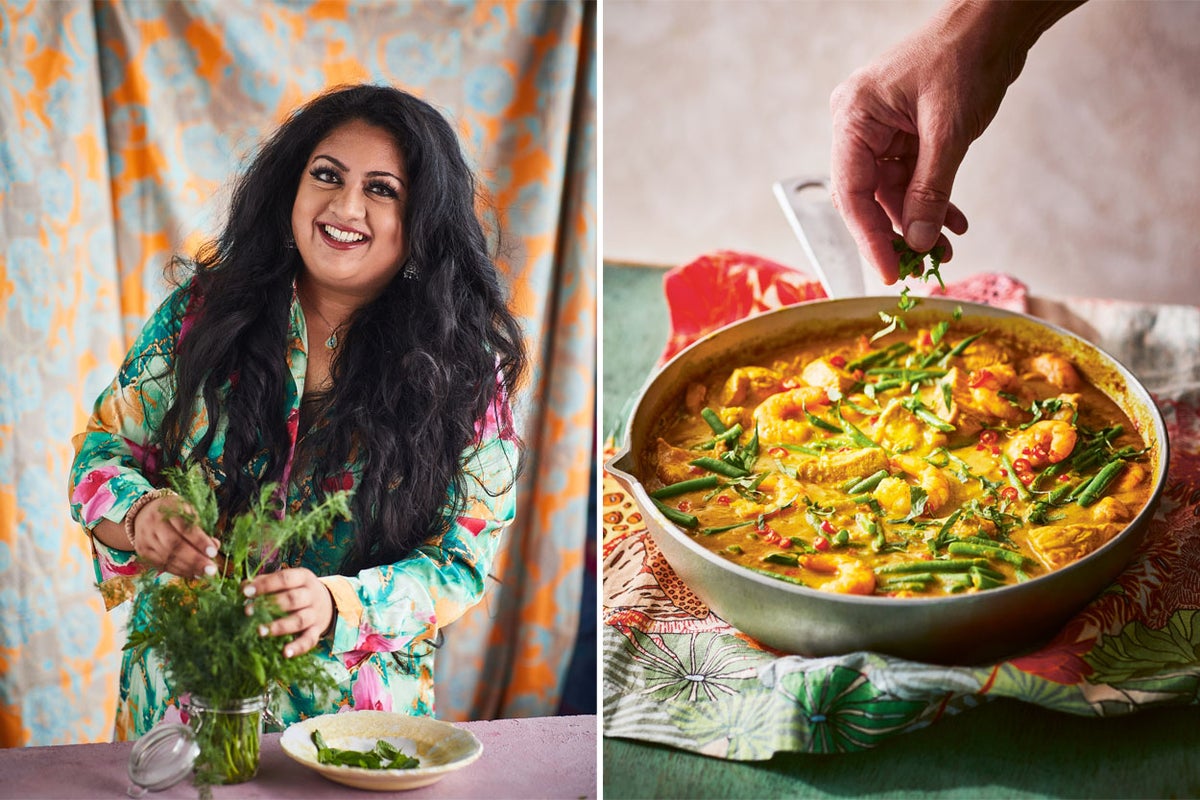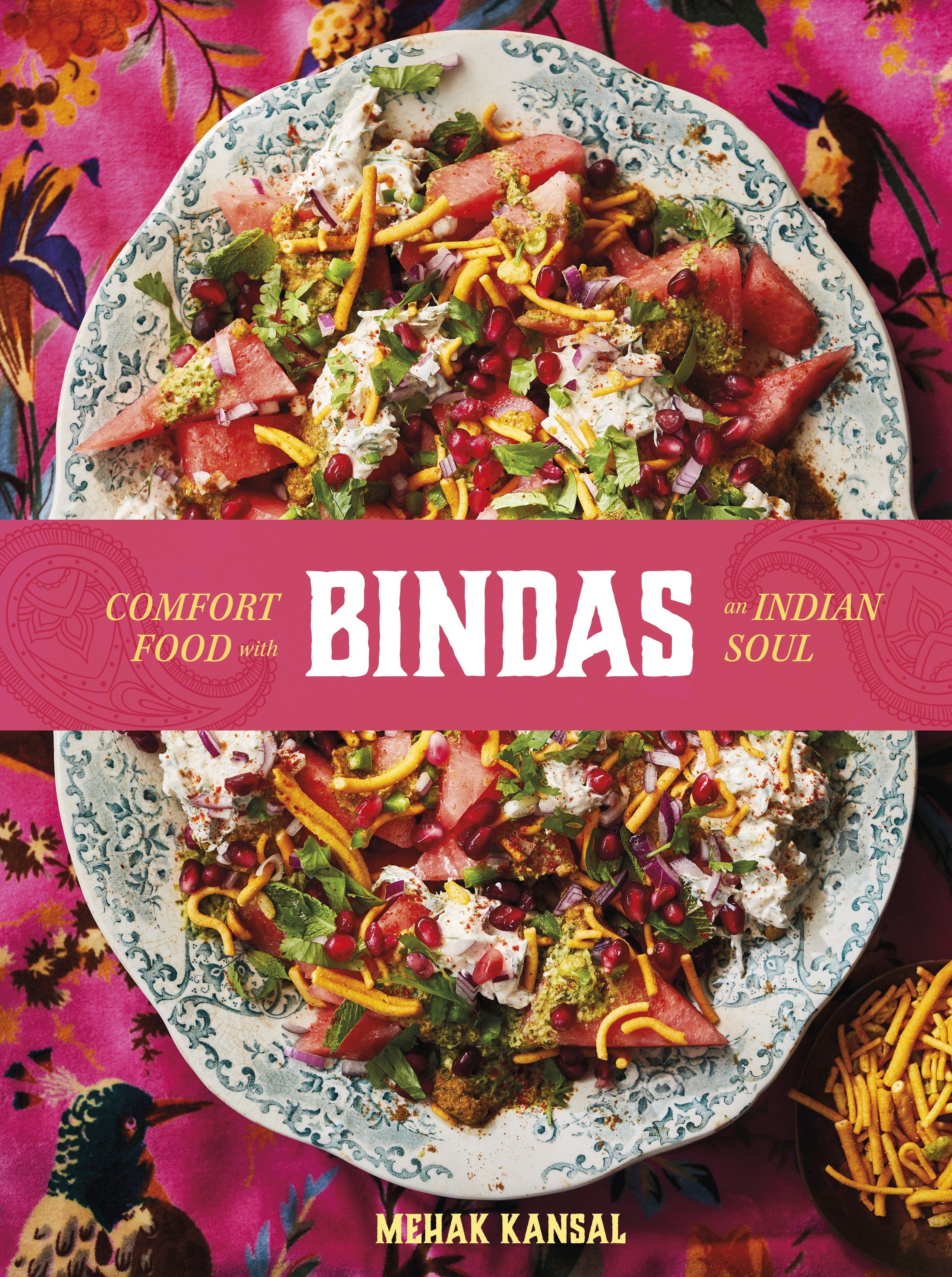
Mehak Kansal cannot believe she has just gone and poured her “whole life into a book”. It sounds rather daunting, filling the pages of a cookbook with your entire world, but Kansal doesn’t seem the hesitant sort. At least, not these days.
The self-taught chef, food writer and founder of Bindas Eatery in West London, grew up in Wiltshire, where she spent her time riding horses and quad bikes and attending boarding school.
But her summers were spent with family in India, where she’d pay her grandmother’s driver to take her on food-based jaunts. “It used to be: pay the driver, go and eat guavas, go to Haji Ali’s juice centre, get fresh mango juice, complain about stomach pain, go and get something to remedy that.
“The driver would go to the pharmacy and give us something so my grandma wouldn’t know. Then we would go to the bowling alley and afterwards have butterscotch ice cream,” remembers Kansal happily. “Then we would say, ‘Yes, yes. We went to the tailor. Yes, yes, we went to the temple.’ Did we do any of those things? No, we just basically ate. That’s what we did!”
But Kansal says she always “struggled and battled with trying to fit in. Am I too English, or am I too Indian? And where do I fit in between?” Her debut cookbook, also called Bindas, is a delicious answer to that – a response to the amalgamation of cultures she has navigated, thanks to Gen X Indian parents, a very English childhood and plates of masala beans on toast.
“This was the book that I knew the world needed,” says Kansal with a laugh. “As cheesy as that sounds.” She wants to make “Indian food really accessible, and to really showcase that Indian food is not just about brown bowls of curry and slop. It’s much more than that.”
Getting to this point, where she is inordinately proud of her food, has been a long time coming. Learning to balance her Indian, Hindu and western values was not straightforward, from “being very English in the way I’m thinking, but the same time, having cravings for certain Indian foods” to being perceived as Muslim (“Even trying to explain I was a Hindu was an alien concept when I was growing up”), and “having my mum not be as articulate as I am because she has an Indian accent”.

At university, she began to find her feet, meeting more people who were Indian and Hindu, “but at the same time, I wasn’t brown enough to fit in with them, because I had a very different way of thinking. I was a lot more liberal and progressive.”
Then Kansal married into a very religious, traditional Indian family. “It just was not me,” she remembers. “I was struggling to conform to the good daughter-in-law routine, especially when I was so independent. I loved my work and loved who I was.”
As a result, she fell into depression. “I couldn’t balance my husband, the marital expectations, in-law pressure and in-law expectations, as well as trying to carve out my own future,” she says, but thankfully, “food was therapy for me.”
She won a competition to launch a pop-up restaurant in London’s Westfield shopping centre. “If I hadn’t seen the competition, if I hadn’t started this small little blog and started cooking for supper clubs, I don’t know where I’d be right now, in all honesty,” she says. “Cooking is a form of art, it’s a form of expression. It’s really who I am. And that’s why the restaurant is called Bindas, because it means to be carefree without any inhibitions.”
Kansal is in a “great place right now. I’m really, really happy.” She’s learnt she doesn’t have to fit in with anyone and can play with any flavours she likes, hence her “cross-pollination” approach to cooking, melding Middle Eastern, Indian, Mexican and even Greek food ideas into her recipes. “I don’t have to make any excuses,” she says.
Her style is “comfort food with an Indian soul,” packed with notes of salty, sweet, crunchy and freshness, thanks to vast amounts of fresh coriander, mint, pomegranate, garlic, ginger, chillies and cumin – the ingredients she couldn’t live without.
However, unlike many chefs and food writers, Kansal’s interest in cooking was not handed down via parents and grandparents. “My mum is a terrible cook. My grandma was even worse, and my dad is also not a good cook, but is a carb fiend,” explains Kansal. He’d make a mean masala omelette and Bombay-style Welsh rarebit, and her mum “loves to eat” and would take Kansal to roadside stalls in India to try the spiciest, most innovative dishes the street vendors were conjuring.
Inadvertently, her mum did get her into cooking, though, by putting her foot down. “It was getting really embarrassing that nobody ever wanted to come to our house for dinner because my mum would have four things in her spice box, and would only make aloo gobi, a chicken curry, one or two chutneys and a dal,” says Kansal, who aged around 12 or 13 asked if her mum could make something different and got thoroughly shot down.
When they were next in India, Kansal went shopping for spices, started growing radishes and gooseberries at home, and then took over the kitchen, becoming the dedicated cook of the family. The first meal she made was a vegetable biryani with gooseberry chutney and apple raita.
Having trained in law and then worked in her family’s property business, her family was a little surprised that she would make food her career. “It was like, ‘Have you gone mad? You’re going to go and flip burgers?’ They were just like, ‘No, what are you doing?’ And now it’s like, ‘Oh, okay, we always knew you could do it,’” says Kansal with a laugh. “Now they’re ecstatic.”
‘Bindas: Comfort Food with an Indian Soul’ by Mehak Kansal (Murdoch Books, £23).
The Ritz wins big at the National Restaurant Awards 2025 – full list revealed
Drinking a soda could be worse than eating a candy bar
How to make flavoured butter at home – and why everyone’s doing it
No pizza oven? No problem. Here’s how to make perfect pie at home
Restaurant wine mark-ups are out of control – here’s how to spot a bargain
No time to cook? A private chef’s hacks for eating more plants on a busy schedule







